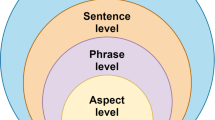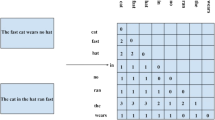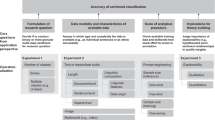Abstract
Sentiment analysis in natural language text is a challenging task involving a deep understanding of both syntax and semantics. Leveraging the polarity of multiword expressions—or concepts—rather than single words can mitigate the difficulty of such a task as these expressions carry more contextual information than isolated words. Such contextual information is the key to understanding both the syntactic and semantic structure of natural language text and hence is useful in tasks such as sentiment analysis. In this work, we propose a new method to enrich SenticNet (a publicly available knowledge base for concept-level sentiment analysis) with domain-level concepts composed of aspects and sentiment word pairs, along with a measure of their polarity. We process a set of unlabeled texts and, by considering the statistical co-occurrence information, generate a direct acyclic graph (DAG) of concepts. The polarity score of known concepts is propagated and used to compute polarity scores of new concepts. By designing and implementing our exhaustive algorithm, we are able to use a seed set containing only two sentiment words (good and bad). In our evaluation conducted on a dataset of hotel reviews, SenticNet was enriched by a factor of three (from 30,000 to nearly 90,000 concepts). The experiments demonstrate the merit of the concepts discovered by our method at improving sentence-level and aspect-level sentiment analysis tasks. Results of the two-factor ANOVA statistical test showed a confidence level of 95 %, verifying that the improvements are statistically significant.


Similar content being viewed by others
Notes
Huang et al. [12] suggest automatically mining seed terms from lists of pros and cons; however, this technique depends on the availability of such information.
References
Blair-Goldensohn, S, Hannan K, McDonald R, Neylon T, Reis GA, Reynar J. Building a sentiment summarizer for local service reviews. In: WWW workshop on NLP in the information explosion era (NLPIX), New York, NY, USA, 2008. ACM.
Bradley M, Lang P. Affective norms for English words (ANEW): stimuli, instruction manual and affective ratings. Technical report, the center for research in psychophysiology, University of Florida, 1999.
Brody S, Elhadad N. An unsupervised aspect-sentiment model for online reviews. In: Human language technologies: the 2010 annual conference of the North American chapter of the association for computational linguistics pp 804–812. Association for Computational Linguistics 2010.
Cambria E, Olsher D, Rajagopal D. SenticNet 3: a common and common-sense knowledge base for cognition-driven sentiment analysis. Quebec City: AAAI; 2014. p. 1515–21.
Cambria E, White B. Jumping NLP curves: a review of natural language processing research. IEEE Comput Intell Mag. 2014;9(2):48–57.
Chikersal P, Poria S, Cambria E. SeNTU: sentiment analysis of tweets by combining a rule based classifier with supervised learning. In: Proceedings of the International Workshop on Semantic Evaluation (SemEval 2015), 2015.
Chikersal P, Poria S, Cambria E, Gelbukh A, Siong CE. Modelling public sentiment in twitter: using linguistic patterns to enhance supervised learning. In: Computational linguistics and intelligent text processing, Springer International Publishing, pp 49–65.
Dave K, Lawrence S, Pennock D. Mining the peanut gallery: opinion extraction and semantic classification of product reviews. In: Proceeding of WWW, Budapest, Hungary, 20–24 May 2003. pp 519–528.
Demiroz G, Yanikoglu B, Tapucu D, Saygin Y. Learning domain-specific polarity lexicons. In: Data mining workshops (ICDMW), 2012 IEEE 12th international conference on 2012. pp 674–679.
Esuli A, Sebastiani F. SentiWordNet: a publicly available lexical resource for opinion mining. In: LREC, 2006.
Hu M, Liu B. Mining and summarizing cus-tomer reviews. In: SIGKDD 2004. pp 168–177.
Huang S, Niu Z, Shi C. Automatic construction of domain-specific sentiment lexicon based on constrained label propagation. Knowl Based Syst. 2014;56:191–200.
Hatzivassiloglou V, McKeown KR. Predicting the semantic orientation of adjectives. In: Proceedings of ACL, 1997. pp 174–181.
Hatzivassiloglou V, Wiebe JM. Effects of adjective orientation and gradability on sentence subjectivity. In: Proceedings of the 18th conference on computational linguistics, vol 1, 2000. Association for Computational Linguistics.
Kamps J, Marx M, Mokken RJ, de Rijke M. Using word net to measure semantic orientation of adjectives. In: Proceedings of LREC’04, 2004. pp 1115–1118.
Kanayama H, Nasukawa T. Fully automatic lexicon expansion for domain oriented sentiment analysis. In: Proceedings of EMNLP, 2006. pp. 355–363.
Lu B, Ott M, Cardie C, Tsou BK. Multi-aspect sentiment analysis with topic models. In: Data mining workshops (ICDMW), 2011.
Lu Y, Castellanos M, Dayal U, Zhai C. Automatic construction of a context-aware sentiment lexicon: an optimization approach. In: Proceedings of WWW, 2011. ACM pp. 347–356.
Pakray P, Neogi S, Bhaskar P, Poria S, Bandyopadhyay S, Gelbukh A. A textual entailment system using anaphora resolution. In: System Report. Text analysis conference recognizing textual entailment track notebook, November 2011.
Poria S, Cambria E, Gelbukh A, Bisio F, Hussain A. Sentiment data flow analysis by means of dynamic linguistic patterns. IEEE Comput Intell Mag. 2015;10(4):26–36.
Poria S, Cambria E, Ku LW, Gui C, Gelbukh A. A rule-based approach to aspect extraction from product reviews. SocialNLP 2014. p 28.
Poria S, Gelbukh A, Agarwal B, Cambria E, Howard N. Common sense knowledge based personality recognition from text. In: Advances in soft computing and its applications, Springer Berlin Heidelberg, 2013. pp 484–496.
Poria S, Gelbukh A, Hussain A, Howard N, Das D, Bandyopadhyay S. Enhanced SenticNet with affective labels for concept-based opinion mining. IEEE Intell Syst. 2013;28(2):31–8.
Qiu G, Liu B, Bu J, Chen C. Expanding domain sentiment lexicon through double propagation. In: IJCAI, vol. 9, pp 1199–1204, 2009.
Strapparava C, Valitutti A. WordNet-affect: an affective extension of WordNet. In: LREC, Lisbon, 2004. pp 1083–1086.
Tsai A, Tsai R, Hsu J. Building a concept-level sentiment dictionary based on commonsense knowledge. IEEE Intell Syst. 2013;28(2):22–30.
Wang H, Lu Y, Zhai C. Latent aspect rating analysis on review text data: a rating regression approach. In: Proceedins of the 16th ACM SIGKDD international conference on knowledge discovery and data mining. pp 783–792. ACM.
Weichselbraun A, Gindl S, Scharl A. Extracting and grounding context-aware sentiment lexicons. IEEE Intell Syst. 2013;28(2):39–46.
Wu Y, Wen M. Disambiguating dynamic sentiment ambiguous adjectives. In: Proceedings of COLING, 2010. pp 1191–1199.
Xu R, Wong KF, Lu Q, Xia Y, Li W. Learning knowledge from relevant webpage for opinion analysis. In: Proceedings of the 2008 IEEE/WIC/ACM international conference on web intelligence and intelligent agent technology, Sydney, Australia, 9–12 Dec 2008. pp 307–313.
Zhao Y, Qin B, Liu T. Collocation polarity disambiguation using web-based pseudo contexts. In: Proceedings of EMNLP/CoNLL, 2012. pp 160–170.
Zhu X, Ghahramani Z. Learning from labeled and unlabeled data with label propagation. Technical report CMU-CALD-02-107, Carnegie Mellon University, 2002.
Author information
Authors and Affiliations
Corresponding author
Ethics declarations
Conflict of Interest
Nir Ofek, Soujanya Poria, Lior Rokach, Erik Cambria, Amir Hussain and Asaf Shabtai declare that they have no conflict of interest.
Informed Consent
All procedures followed were in accordance with the ethical standards of the responsible committee on human experimentation (institutional and national) and with the Helsinki Declaration of 1975, as revised in 2008 (5). Additional informed consent was obtained from all patients for which identifying information is included in this article.
Human and Animal Rights
This article does not contain any studies with human or animal subjects performed by the any of the authors.
Rights and permissions
About this article
Cite this article
Ofek, N., Poria, S., Rokach, L. et al. Unsupervised Commonsense Knowledge Enrichment for Domain-Specific Sentiment Analysis. Cogn Comput 8, 467–477 (2016). https://doi.org/10.1007/s12559-015-9375-3
Received:
Accepted:
Published:
Issue Date:
DOI: https://doi.org/10.1007/s12559-015-9375-3




